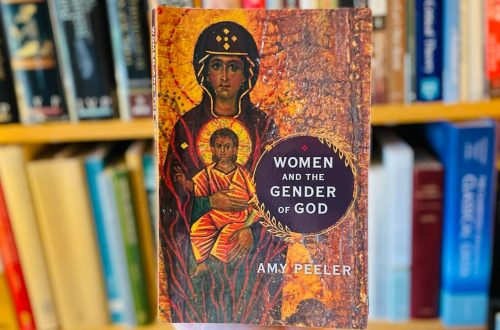 In 1998, a Copernican Revolution was in the offing in my life. It began like a thunderbolt with a sermon from John Piper on Romans 3:25-26. I was studying theology at Dallas Theological Seminary, yet this message delivered at a collegiate conference was the most important thing I heard during my seminary career. It was the most powerful exposition of the innermost meaning of the cross that I had ever heard.
In 1998, a Copernican Revolution was in the offing in my life. It began like a thunderbolt with a sermon from John Piper on Romans 3:25-26. I was studying theology at Dallas Theological Seminary, yet this message delivered at a collegiate conference was the most important thing I heard during my seminary career. It was the most powerful exposition of the innermost meaning of the cross that I had ever heard.
As you meditate on the cross this Good Friday, I thought you might benefit from it too. Download here or listen below.
[audio:http://cdn.desiringgod.org/audio/events/19980101.mp3]



13 Comments
Rebecca Marchbanks
Just listened with my husband…thanks for posting this.
John Holmberg
Are you honestly suggesting that Christ died for God?
Denny Burk
John,
Yes, in one sense he did. Jesus died so that God could be shown to be “just and the justifier of the one who has faith in Jesus” (Romans 3:26). That is what Piper is getting at in this sermon, and it’s a glorious truth!
Happy Easter!
Denny
Darius
What’s wrong with that, John? It would also be accurate to say that Jesus died to make the devil look like a fool, or that He died so that billions of people would one day worship Him. I haven’t heard the sermon yet, but I doubt Piper says that Jesus didn’t die for us, but that in a very real sense, He also died for God. That doesn’t seem that big of a stretch.
Jeff
Hi Denny,
As I see it, your idea that everything God does (even his act on the cross) is “self-centered” is problematic because it leads you straight to panentheism–the idea that God needs the world in order to be God.
You can see this if you follow your line of reasoning all the way out.
(1) God always does that which most glorifies him. This is what it means to be God.
(2) God is sovereign over every event in human history–meaning that he determines every event in history to happen in the precise way that it does.
From (1) and (2), we can conclude (3): God’s determination of THIS particular world must be the divine action that glorifies God the most. In other words, if God pursues his own glory in everything he does–and if he has, in fact, sovereignly determined that THIS particular world exists–then his soverign act of determining this world must be the act that most glorifies him.
(4) God is most glorified (i.e., God is God) because this particular world exists.
(5) God needs the world in order to be God.
Follow your logic out carefully–you’re advocating panentheism! It may sound God-centered to say that God died for himself, but ironically, that theology actually demeans God because it makes the world’s existence necessary to God’s own glorification! How do you avoid that problem? You either give up (1) or (2). You can’t give up (2). So you have to give up (1).
And that’s precisely what Paul does in 1 Cor. 2 when he is telling the Corinthians about the gospel of Christ crucified: “But we speak God’s wisdom, secret and hidden, which God decreed before the ages for OUR glory” (1 Cor 2:7).
Paul says Christ died for us. Foolish? Yes! A scandal? Yes! But that’s the gospel.
Blessings,
Jeff
John Holmberg
Denny & Darius,
The post title is set up in such a way as to suggest that it’s an either/or, not a both/and (hence, “for us OR for God”). From both of your remarks, you don’t take it to be an either/or but a both/and. If that’s the case, then I agree with that. I only asked my question because I believe false dichotomies pervade evangelicalism (e.g. spoken gospel or social gospel; God-centered vs. man-centered; penal substitution vs. christus victor; etc.). I’m glad to see from your remarks that this is not a false dichotomy. The title of the post suggested otherwise, but thanks for your clarification.
Roy
I was always puzzled at the phrase “his divine forbearance he had passed over former sins” (Rom 3:25). It didn’t seem right… not consistent with the holiness of God. And in fact, it isn’t. His “passing over” those (and my) sins is resolved either at the Cross or in eternal Hell. Thank you for posting this Denny.
Joel
I reject the distinction. I think the title of this post puts forth a false dichotomy. It’s not either / or. It’s both.
Darius T
Jeff, it says “TO our glory”… NOT “for our glory.”
“For the glory set before Him, He endured the cross…”
Sounds like it was a “self-centered” act. Read Piper’s Desiring God, he does a good job of fleshing out this idea. God is ALREADY as glorious as He could ever get… He doesn’t change… but He CAN receive more glory.
Jeff
Hi Darius,
Thanks for your response. Some thoughts:
The ESV, NIV, TNIV, NRSV, HCSB, and NKJV all translate it “for our glory,” so that’s why I cited it that way. Are they all wrong?
The verse you cite (“for the glory set before him, he endured the cross”) is Heb. 12:2. You argue that this means that God’s act on the cross was a “self-centered” one. But, as I read it, that verse clearly refers to Jesus during his incarnate life, not God in his eternal life. Philippians 2 emphasizes the distinction between God’s eternal life and Jesus’ incarnate life when it says that Jesus “did not count equality with God something to be grasped” but “made himself nothing”. There’s obviously a distinction being drawn there between God in eternity and Jesus in his humanity. And, obviously, the human Jesus WAS glorified by what he endured, because after his death and resurrection, he now is “seated at the right hand” of God, as the rest of the verse you quoted says. In other words, he’s back to the full, glorious status that he had previously before the incarnation. So, the verse you quoted isn’t referring to God being self-centered, but to the incarnate Jesus being glorified by returning to the status that was rightfully his for eternity.
But, even if we accept that it is talking about God in his eternal life, the argument I gave in my previous comment still applies, and it would lead us to interpret it differently than you suggest, because your interpretation leads to the problems I pointed out.
Finally, I’m not sure how to make sense of your last statement: “God is already as glorious as he could ever get…but he can receive more glory.” That seems like a clear contradiction to me.
In any event, it would be helpful for you to show me which of my arguments is incorrect in the five points I provided to Denny in my previous comment. As of now, they seem to be clear, logical implications of what he is saying. I’m happy to be corrected, if you can show me where I go off track.
Blessings,
Jeff
D.J. Williams
Jeff,
I think your error comes in misunderstanding “glorious” and “glorified,” as Darius pointed out. God is self-sufficient – no one here is advocating otherwise. He is intrinsically glorious – beautiful, wise, righteous, loving, etc. However, being glorified entails others seeing, recognizing, and reveling in God’s intrinsic glory. God’s gloriousness is his intrinsic quality. God’s glorification is the recognition of that quality by others. The former is a part of his nature as God, working for the latter is a result of his loving character expressing itself toward us, his creation (as the most loving thing he can do for us is to showcase his glory to us). Thus, while God does work to glorify himself in all things, even without us God is still quite glorious and still quite God.
Jeff
Hi D.J.,
Thank you for your very helpful comment. I think that distinction makes a lot of sense, if I’m understanding you correctly. You’re saying that God never does anything for his benefit, but rather, he always does it for ours. When we give God glory, we aren’t really giving him anything (he already has everything!). WE’RE the ones who are being altered by it, because we’re “seeing, recognizing, and reveling in God’s intrinsic glory” in a new way.
That’s very helpful. It fits nicely with my original concern about Jesus’ death on the cross being “for us” instead of “for God.” Jesus didn’t die on the cross for his benefit; he died for our benefit. Indeed, he died for US in the sense that it helps us recognize and revel in his glory.
It also fits with what Paul says in 1 Cor 2:7, in the sense that he’s saying that it was for our benefit (our glory). And, incidentally, it fits with the reason given in the creeds: “for us and for our salvation.”
Blessings,
Jeff
Pingback: